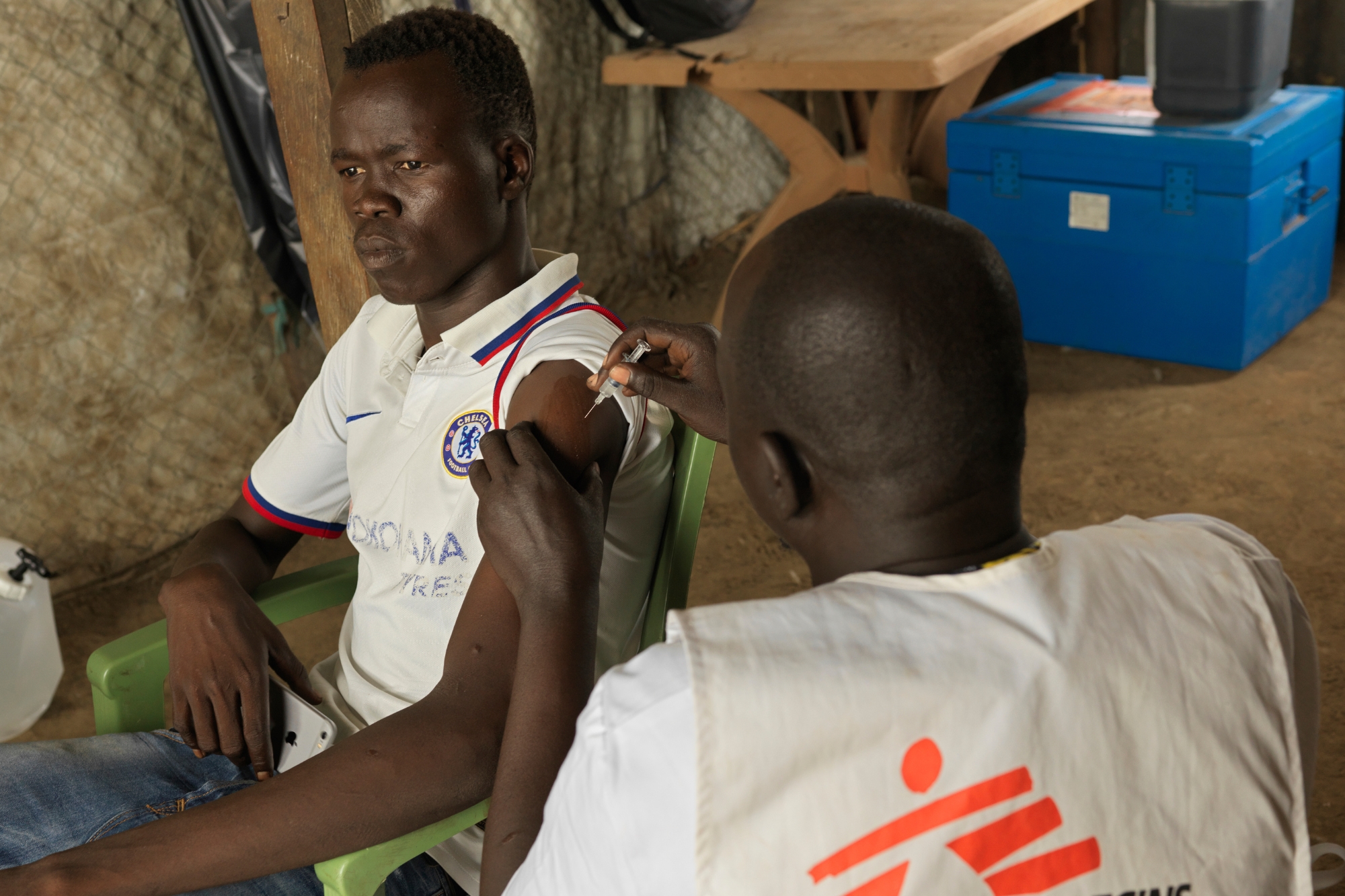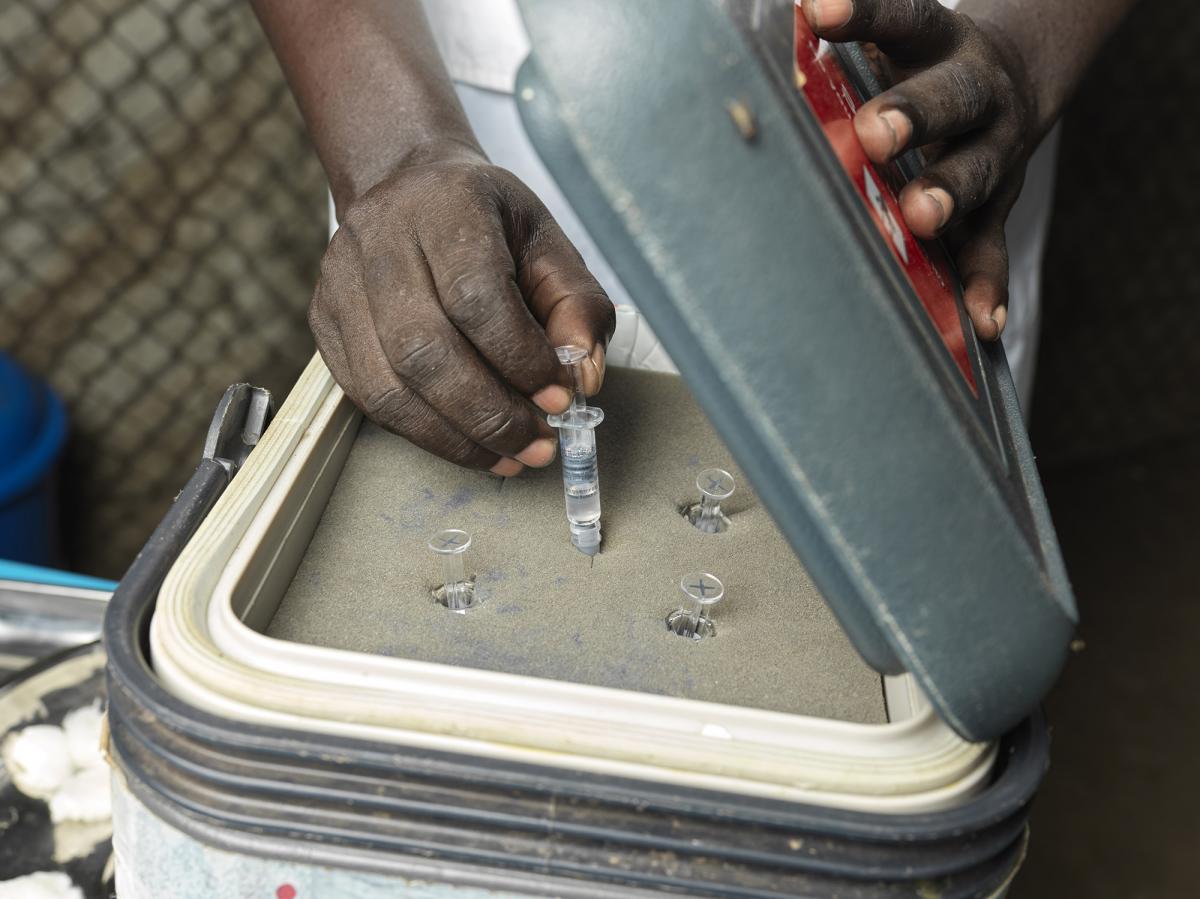South Sudan: Logistics Lessons from the World's First Hepatitis E Campaign

Last year witnessed three round vaccinations of hepatitis E, where MSF teams in collaboration with the health authorities in South Sudan had carried out a mass campaign in response to an outbreak, with a main objective in the fight against a disease that is especially fatal for pregnant women.
Globally, hepatitis E is the most common cause of acute viral hepatitis, causing an estimation of 20 million infections and 44,000 deaths per year. It is transmitted through faecal contamination of food and water. Large-scale outbreaks typically occur when water and sanitation are inadequate, such as in mass displacement camps. There is no specific treatment for hepatitis E, which as a fatality rate of up to 25 percent among pregnant women. It also increases the risk of spontaneous abortions and stillbirths.
In March, April and October 2022, MSF and South Sudan's Ministry of Health jointly carried out the three rounds of the hepatitis E vaccination campaign in Bentiu internally displaced persons camp in Unity state. Around 30,000 people have received the vaccine. Bentiu is the largest displaced persons camp in South Sudan, created in 2014 at the height of the war. Over 100,000 persons reside there with a lot of movements in and out of the camp. MSF has been present in Bentiu since inception of the camp, previously protection of civilian site, and has seen hepatitis E outbreaks since 2015.
The outbreaks are a consequence of the intense floods that swept through this part of the country, further worsened the situation. These floods stood as a reminder of the climate shocks that compound access difficulties. This is in addition to the appalling living conditions, including a lack of access to adequate water, sanitation and hygiene.
Despite these challenges, our teams displayed adaptability, ensuring the completion of the vaccination rounds.
In this interview, we revisit the process of the world's first hepatitis E campaign, focusing on the logistical and operational aspects, to highlight the lessons learned and how our team-maintained agility throughout the campaign phases.
Nikolai Mikhailenko, the MSF Supply Chain Coordinator in South Sudan, provides further insights:
Were there specific storage and transportation requirements for the hepatitis vaccination campaign, given the conditions and location of its delivery?
The introduced vaccine (VACCINE HEPATITIS E, adult, monodose, syr.) posed additional challenges, primarily due to its packaging. Unlike the typical multi-dose vials for mass campaigns, this vaccine came as a single dose in a pre-filled glass syringe. This format took up considerably more space in the fridge. The volume of doses planned for the three rounds exceeded the existing storage capacity of our cold chain infrastructure in the country, necessitating innovative solutions.
The decision was made that during the project's duration, the vaccines would be stored in Juba using two refrigerator trucks, which maintained temperatures between 2-8°C.
Additionally, a truck was modified to function as a freezer, operating at -20°C. This was primarily for this newly introduced type of ice packs to our teams, which consisted of a mixture of paraffin and water. These new ice packs were used to facilitate the transportation of vaccines.
The cold chain storage was closely monitored by MSF Logistics & Supply team. As per standard procedures, checks were made twice daily. Part of this monitoring team included a dedicated technician from the truck company, responsible for overseeing the technical aspects of the trucks and refrigerators.
While MSF project for hepatitis E response in Bentiu camp had the infrastructure to maintain 9,000 doses in an active cold chain, this was insufficient to complete a single round. Given the constraints in storage capacity in Bentiu, and the inability to station a refrigerator truck on-site, the decision was taken to continually ship vaccines from Juba throughout the vaccination period. This solution ensured that vaccines remained viable and could be administered effectively during each phase of the campaign.
Cold chain preparation for transportation in Juba
Hepatitis-E vaccines had been transported in a newly introduced type of cold chain box to our teams. To ensure that the vaccines are delivered safely without any disruptions in the cold chain, MSF Logistics and Supply team spent several weeks testing these boxes to meet the required criteria.
According to the tests conducted, temperatures inside the cold chain boxes remained consistently between 3°C and 6°C, over an 8-day period. This stability not only allowed for the vaccines to be stored safely inside the boxes during vaccination rounds, but it also increased the project's storage capacity from 9,000 up to 25,000 vaccines. These vaccines can now be stored both in fridges and within these cold chain boxes.
The preparation process to get the required quantity of vaccines ready was extensive. It ranged from conditioning frozen icepacks to packing the vaccines into boxes, all culminating in their readiness for shipment. All these preparations were carried out inside a refrigerator truck, maintaining a steady temperature of approximately 5°C.
Cold chain transportation from Juba to Bentiu
Vaccines were shipped from Juba to Bentiu using two types of planes: the Logistic Cluster plane with a capacity of seven ton and the regular rotations of the MSF plane with one ton capacity.
Deliveries were organized according to the dates requested by the project. Packing for the shipment commenced the day prior to the flight, following the Standard Operating Procedure (SoP) for the new type of cold chain boxes.
How did the logistics team effectively ensure that essential medical supplies and equipment were available at the vaccination sites?
The first team arrived in South Sudan in October 2021. However, due to floods in Bentiu, preparations were put on standby until January 2022. The subsequent months were spent addressing basic needs in the field: establishing accommodation, organizing storage for medical and logistical materials, recruiting personnel, setting up the base, and facilitating the delivery of essential items from Juba to Bentiu.
For the initial setup, basic items required for medical and logistical preparations were transported using a chartered plane with a capacity of nine ton. This was solely for the preparation phase. The severe floods, seen as a result of climate shocks in the Bentiu region, made the procurement of supplies challenging. Available items in the local market were considerably more expensive than in Juba.
Logistical and medical supplies, including medicines and equipment, were sourced from international providers, adhering to standard requirements.

During the third round, Zélie Antier acted as MSF field coordinator. She elaborates on additional operational challenges and the strategies utilized by our team.
Could you shed light on your involvement in the last round of the campaign in Bentiu? What obstacles did you encounter, and what significant lessons learned emerged?
This third round of the vaccination was challenging and long, but successful. In fact, 113% of the initial target (around 26,848 persons) reached in the third round. Thanks to the lessons learnt from the first and second rounds, the last round was easier to design and implement, especially for cold chain and waste management.
Cold chain management in the third round was one of the most key success factors. Once the shipments of 34,800 vaccines arrived to Bentiu in different batches, we were able to store them gradually in 12 fridges, the volume was huge. On a daily basis, for about 20 days, a joint cold chain team of 15 staff from MSF and the South Sudanese Ministry of Health worked from 4:00AM for about 2 hours on the conditioning and loading of the ice packs and the vaccines in the carriers.
In the middle of the third round of the campaign, the dykes protecting the camp compound from being flooded broke, flooding part of the camp and the road, making road movements between MSF base and the camp impossible. But we managed to ensure continuity of the vaccination campaign by using boats to transport the vaccine supplies and our teams.
In general, the campaign was well-accepted and tolerated by the population. Indeed, there was a high vaccination coverage of at least one dose of the vaccine (86%- source: HEV Study Bentiu by Epicentre) among the eligible population of Bentiu camp following three rounds of vaccination.
For the future, it would be necessary to explore the possibility of vaccinating children, as for now the vaccine is only recommended for people above 16 years, while 40% of hepatitis E cases in Bentiu were children under 5. In addition, the availability of multi-dose vaccines instead of single dose glass syringes would facilitate the cold chain and waste management aspects of future vaccination campaigns.
This first hepatitis E vaccination campaign in an outbreak setting was overall successful with many lessons learnt, not only for MSF, but also for the whole medical humanitarian community. While other outbreak control measures are also necessary, including improving water and sanitation services, health officials believe this vaccination campaign is an important step toward reducing the burden of hepatitis E in the future.
The success of the Bentiu vaccination campaign shows that it is possible to use the vaccine for outbreak response, even under difficult conditions. Hence, South Sudan’s Ministry of Health and MSF teams have been monitoring and reporting on the results of the vaccination campaign.
MSF hopes the campaign will encourage other countries to use the vaccine as part of measures to control outbreaks of hepatitis E.





Leave a Comment